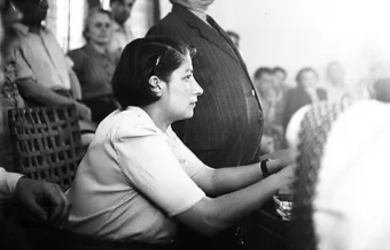 Zivia Lubetkin grew up in a religious home, amongst siblings who were much more interested in the secular movements of the time. This tension was heightened as her brothers chose to join the Revisionist movement, and she decided to become a member of the Freiheit movement, which later became known as Dror. She became a central figure in the senior movement leadership and the coordinator of the agricultural training programs of Hechalutz.
Zivia Lubetkin grew up in a religious home, amongst siblings who were much more interested in the secular movements of the time. This tension was heightened as her brothers chose to join the Revisionist movement, and she decided to become a member of the Freiheit movement, which later became known as Dror. She became a central figure in the senior movement leadership and the coordinator of the agricultural training programs of Hechalutz.
In 1940, she returned from Lithuania to occupied Warsaw and became the driving force behind the movement in the ghetto. She rebuilt the local branch of the movement, finding funding for movement work, younger movement members, and diverse educational activities. Among these was the establishment of an underground school.
Lubetkin was among the founders of the Anti-Fascist Bloc, the first combat organization established in the Warsaw ghetto, and the Jewish Fighting Organisation, the ŻOB. She fought in the battles in the ghetto among these organizations in the uprising in April 1943. She was one of the few who succeeded in escaping the ghetto through the sewer system, joining a unit of surviving Jewish fighters of the ŻOB who took part in the Polish Warsaw Uprising of August 1944. After the war, she helped organize the Habricha (The Escape) movement in Poland.
Lubetkin and her comrade (and husband) Yitzhak (Antek) Zuckerman moved to Palestine and were among the founders of Kibbutz Lohamei HaGeta’ot. She was one of the first people in Palestine to tell the story of the Holocaust and the uprising, even testifying in the trial of Adolf Eichmann. Her name became a symbol of the heroism of the fighters in the ghetto.